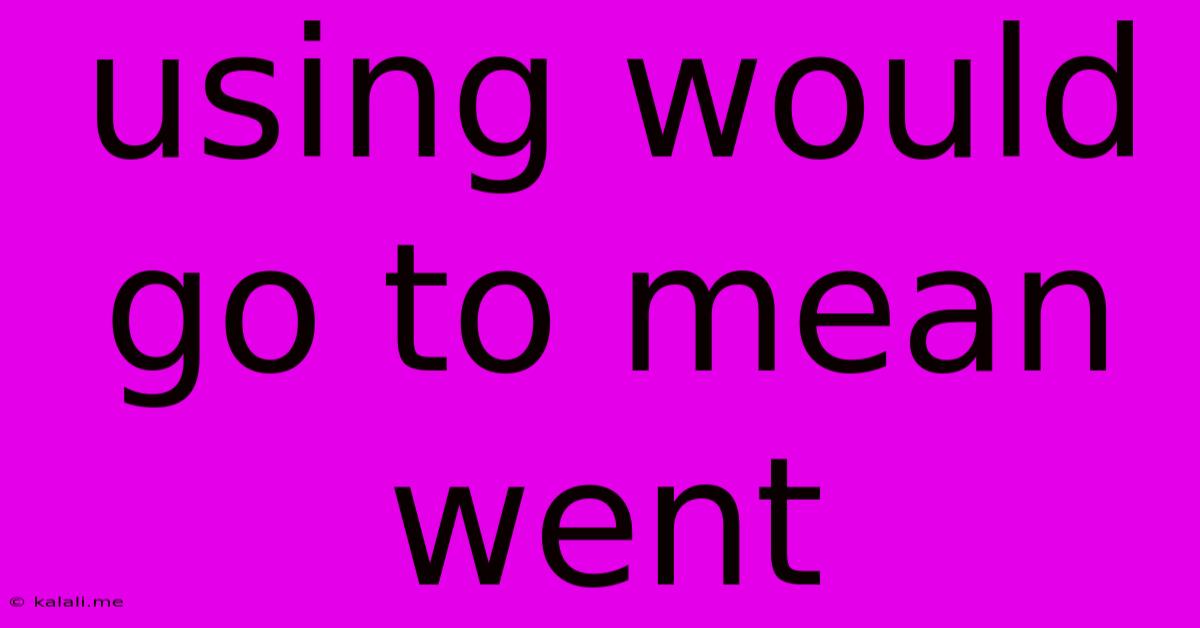Using Would Go To Mean Went
Kalali
Jun 07, 2025 · 3 min read

Table of Contents
Using "Would Go" to Mean "Went": A Subtle Shift in Tense and Meaning
This article delves into the nuances of using "would go" to express past habitual actions, clarifying its subtle difference from simply using "went." Understanding this distinction is crucial for achieving clarity and precision in your writing, while simultaneously enhancing your grasp of English grammar. While both phrases describe past actions, the choice between them significantly impacts the conveyed meaning and overall tone.
When "Went" is Sufficient
The simple past tense verb "went" straightforwardly describes a single past event. For instance, "I went to the store yesterday" clearly indicates a one-time trip. This is the most common and often the most appropriate way to describe a past action. No further implication about frequency or habit is included. This is your go-to choice for most situations involving past actions.
The Power of "Would Go": Habitual Past Actions
The phrase "would go," however, carries a different weight. It's used to describe a habitual or repeated action in the past. It paints a picture of a regular occurrence, a routine, or a characteristic behavior. This subtle shift in meaning adds depth and context to the narrative.
For example, compare these two sentences:
- "I went to the park last Sunday." (Single event)
- "I would go to the park every Sunday when I was a child." (Habitual action)
Notice how the second sentence evokes a sense of familiarity and routine. It implies a pattern of behavior that occurred regularly over a period of time. This is where "would go" shines – conveying a repeated past action with a sense of regularity and perhaps even nostalgia.
Beyond Simple Repetition: Implying Other Nuances
"Would go" can also subtly convey other information:
-
Imagination or Hypothetical Past: "If I had the time, I would go to the beach every day." This uses "would go" to describe a past action that didn't actually occur, but was a possibility.
-
Emphasis on the Regularity of the Action: "Every Tuesday, without fail, I would go to the market." The use of "would go" here stresses the consistency and reliability of the past action.
-
Setting a Scene or Establishing a Character's Routine: "In the summers, she would go to the lake and spend hours swimming." This creates a vivid image and contributes to the storytelling aspect.
Avoiding Common Mistakes:
Be mindful of the context. Using "would go" where "went" is sufficient can sound unnatural or even incorrect. Always consider the specific nuance you want to convey. Overuse can lead to awkward phrasing and may confuse the reader.
In Conclusion:
The choice between "went" and "would go" is a stylistic one, but a powerful one nonetheless. Mastering this subtle difference elevates your writing, enabling you to express past actions with greater precision and nuance. By understanding the context and the implied meaning of each phrase, you can choose the most effective option to accurately convey your intended message. Remember to prioritize clarity and avoid unnecessary complexity; select the verb tense that most accurately and naturally reflects the action you are describing.
Latest Posts
Latest Posts
-
How To Turn On Headlamp In Fallout 76
Jun 07, 2025
-
Locus Of Points Equidistant From A Point And A Circle
Jun 07, 2025
-
How To Find Out Where A Transaction Came From
Jun 07, 2025
-
How Do You Say Pecan In Spanish
Jun 07, 2025
-
Burning A Candle At Both Ends
Jun 07, 2025
Related Post
Thank you for visiting our website which covers about Using Would Go To Mean Went . We hope the information provided has been useful to you. Feel free to contact us if you have any questions or need further assistance. See you next time and don't miss to bookmark.